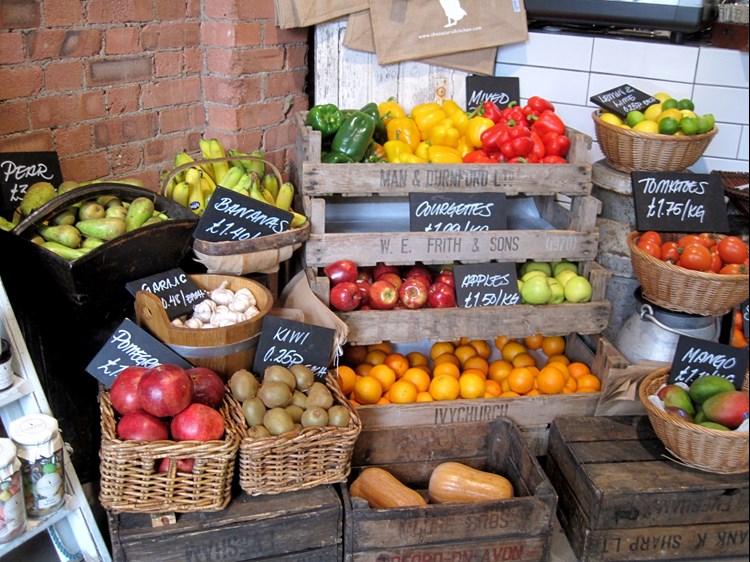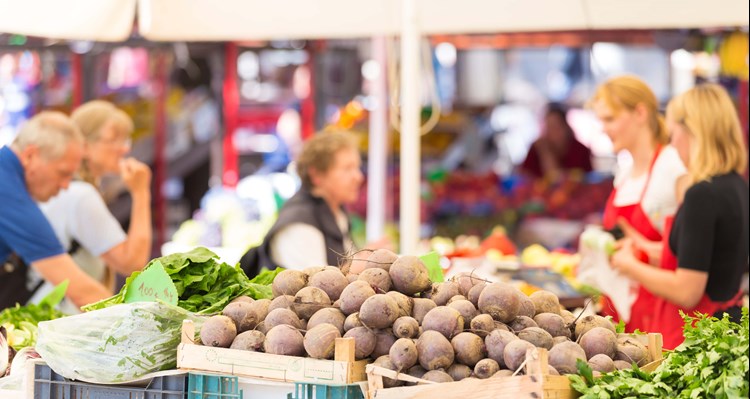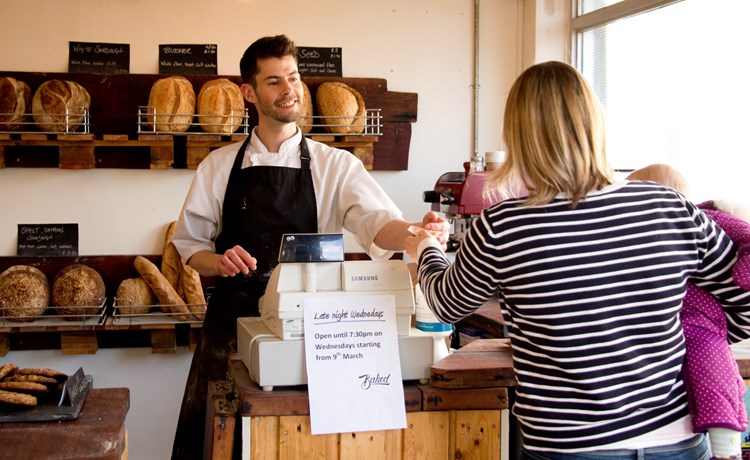Building a Good Food Movement
Tom Andrews, Director of Sustainable Food Cities at the Soil Association
While there is no doubt it has brought us bewildering choice, knock-down prices and ready convenience, there is a growing consensus that the modern food system - and the ‘fast’ food culture it has fostered - costs more than people, places or the planet can afford. The facts are sobering. A spiralling epidemic of obesity, diabetes and other diet-related ill-health means our children may become the first generation to live shorter lives than their parents. From field to fork, our food system produces more than a fifth of all our greenhouse gas emissions - as much as all of our transport or all of our domestic power consumption - and is contributing to a seemingly inexorable decline in the quality of our soils, our water and our biodiversity. And most pernicious of all, as relentlessly rising food prices make food poverty a stark reality for millions of people, we continue to throw away more than half of all the food we produce. As with all complex issues involving powerful transnational corporations, minimal-intervention government and, for the most part, an uninformed and disempowered public, the food debate has descended into an endless game of pass the buck. The producers blame the multiple retailers who blame consumer choice. The caterers blame the procurement officers who blame Westminster spending cuts. And we all blame the global system. The fault, it seems, lies everywhere and nowhere at once, and yet here we find ourselves with a food sector worth £100 billion each year but whose vast hidden costs - in gastric bands and lost jobs and environmental degradation - are only now, finally, being totted up.
As with all complex issues involving powerful transnational corporations, minimal-intervention government and, for the most part, an uninformed and disempowered public, the food debate has descended into an endless game of pass the buck. The producers blame the multiple retailers who blame consumer choice. The caterers blame the procurement officers who blame Westminster spending cuts. And we all blame the global system. The fault, it seems, lies everywhere and nowhere at once, and yet here we find ourselves with a food sector worth £100 billion each year but whose vast hidden costs - in gastric bands and lost jobs and environmental degradation - are only now, finally, being totted up.
The problem with the blame game, of course, is that it doesn’t lead anywhere positive - it simply reinforces the parochialism of the status quo and the pervasiveness of the belief that there is no other way. But what if there was not only an alternative, but one that could bring social, economic and environmental benefit in equal measure? Could we, by working together across sectoral, institutional and community boundaries and driven by a new sense of common purpose, design a food system that not only improves the health of people and the planet but also creates jobs and prosperity? In towns and cities across the UK, new partnerships between public, private and voluntary sector organisations are being forged with exactly this question in mind and, while it is still early days, their efforts to become ‘Sustainable Food Cities’ could provide the impetus for a radical shift in the current food paradigm.

At its heart, the Sustainable Food Cities approach is about recognising the pivotal role that food can play in driving positive change. It is about a wide range of public agencies and departments - including health, sustainability, planning, economic development and neighbourhood renewal - working together with businesses, NGOs and communities to develop a joint vision of the food culture and food system they would like to see and then working together to turn that vision into reality. It is about completely re-imagining a city - or town or borough or district - through the lens of good food.
So… imagine a city where every nursery, school and college, every hospital and care setting, every restaurant and workplace canteen serves only healthy and sustainable meals; and where everyone has access to affordable fresh, seasonal, local and organic produce within 500 metres of where they live, no matter where they live. Imagine a city where good food is visible and celebrated in every corner: in local markets and independents retailers, at food festivals and events, in gardens, parks and borders, on the radio and in the papers; or where people of all ages and backgrounds are developing skills in growing and cooking, are developing new food enterprises and are practically involved in creating a vibrant and diverse food culture in their own community. Imagine a city where healthy and sustainable food is embedded into every relevant policy and strategy - from health and economic development to procurement and planning - and where communities, NGOs and public agencies are working together with food producers, processors and retailers to make good food a defining characteristic of their city. Now imagine the potential impact all this could have in improving people’s health and wellbeing; in creating new businesses and jobs; in reducing greenhouse gas emissions and waste; in breaking down cultural boundaries and fostering community cohesion.

The standard response to such apparently utopian musings is to begin to list all the reasons why it can never happen: the existing system is too pervasive and embedded; the food companies will never play ball; there isn’t enough money or resource to get this kind of initiative going; the public simply aren’t interested. It is an understandable reaction, particularly considering the mind-set engendered by our current financial woes, but it is wrong. In a number of places the system is changing; some of the more enlightened food companies are right at the forefront of this change; institutions are finding resources to make change happen or are reconfiguring existing resources to the same end; and there is absolutely no doubt that a greater and greater proportion of the public not only care but are willing to put considerable effort into becoming the agents of change in their own communities. A few examples will help to illustrate:
Ten years ago, the idea that huge multinational food service companies would be competing to provide meals made from fresh, seasonal, local and organic produce would have been laughable. And yet the number of meals served each year which have the Soil Association’s Food For Life Served Here award for containing healthy, ethical, sustainable and local ingredients now is approaching 350 million. The catering companies involved are not only showing greater care over what their customers eat but are also gaining significant competitive advantage when tendering for contracts. They are recognising that what is good for people can also be very good for business. And the people eating the meals - in nurseries, schools and colleges, in hospitals and care settings, in restaurants and workplace canteens - are not only getting delicious wholesome food, they are also starting to feel that is exactly what they should be getting. They are beginning to care about good food. It is a trite phrase, but this is a win-win situation and exemplifies how creative thinking and new forms of collaboration can lead to seismic and systemic change.

Go to one of the one thousand Food for Life schools in England and Wales to see how a holistic approach to food education and engagement is not only helping children, parents and local communities to understand and appreciate the importance of good food, but is giving them the skills they need to feed themselves well throughout their lives and increasing educational attainment into the bargain. Or visit one of the 650 new local food enterprises that were created through the Making Local Food Work programme, where social entrepreneurs are creating thriving good food businesses, bringing jobs and prosperity to their local economies.
Go to Brighton, one of the earliest pioneers of the Sustainable Food City approach, where they have introduced a Planning Advisory Note to ensure that developers consider food as an integral part of the design planning process; or to one of the many local authorities that have managed to block the proliferation of fast food outlets near schools. Go to Cambridge, where they are promoting a Sustainable Food Pledge and Award Scheme for Businesses that promotes and showcases good practice amongst local food businesses who, for instance, source more local and organic produce, reduce meat or serve sustainable fish.

Look at the food charters developed in Bristol, Plymouth, Carlisle and Belfast to see the ambition of their vision for what the future landscape of city food could look like or read about the Food and Fun programme piloted by Food Cardiff which provides a lifeline for families needing access to good food during the summer holidays and that is now being rolled out in fifteen local authorities across Wales.
I could go on and on, but the point is that when you scratch the surface, as I have been lucky enough to do, you realise that the only thing stopping us from creating a truly healthy and sustainable food culture, and reaping the immeasurable rewards it would bring, is us. Whether we are acting as food providers or food consumers, as employees or employers, procurers or caterers, policy makers or practitioners, we all have immense power over the way our food culture and system develops. It is, ultimately, about whether we care enough to exercise that power and whether we are willing to work together in common cause and to mutual benefit in changing the status quo. It takes passion and effort and commitment, but let us not fool ourselves any more that averting the looming food catastrophe is someone else’s responsibility - the buck stops here.
Sustainable Food Cities is a multi-partner programme led by the Soil Association in partnership with Sustain and Food Matters and funded by the Esmee Fairbairn Foundation which is supporting towns and cities across the UK to develop transformational healthy and sustainable food programmes. If your organisation can help or your town or city would like to get involved, please get in touch - tandrews@soilassociation.org

